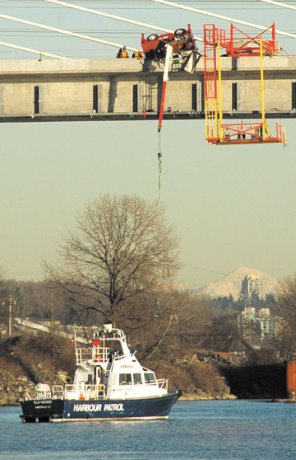Two companies responsible for Metro Vancouver’s Canada Line construction have been fined a record amount for their part in the death of a crane operator.
Workplace safety
Two companies responsible for Metro Vancouver’s Canada Line construction have been fined a record amount for their part in the death of a crane operator.
WorkSafeBC imposed administrative penalties totaling $233,535.58 on SNC-Lavalin Constructors (Pacific) Inc. and Rizzani de Eccher Inc., which make up a joint venture doing business as RSL Joint Venture.
An additional penalty of $81,808.13 was imposed on SNC-Lavalin Constructors (Pacific) Inc.,
the prime contractor on the rapid transit expansion project in Metro Vancouver.
“No penalties are adequate when a life is lost, but we hope they can serve to motivate these employers and others to comply with the occupational health and safety regulation, particularly as it applies to training and supervision,” said Roberta Ellis, vice-president of the investigation division of WorkSafeBC.
The penalties are two of the highest ever imposed by WorkSafeBC, reflecting the seriousness of the violations and the resulting fatality.
Andrew Slobodian, 22, died on Jan. 21, 2008, while working for RSL Joint Venture on the project.
Slobodian was operating a small carry-deck crane about midway along the bridge deck that spans the Fraser River from Vancouver to Richmond.
He was attempting to move a load of hardware to a crew building a pedestrian walkway below the deck.
When he swung the crane arm and the bucket of supplies over the bridge guide-way, the crane lost its centre of gravity and tipped over on its driver side.
As Slobodian tried to exit the rear of the crane, he was pinched between the crane and the guide-way’s parapet wall. He was killed instantly.
The official cause of the incident was that Slobodian tried to lift too much weight for the configuration of the boom and outriggers of the Shuttlelift crane, which resulted in it tipping over.
The WorkSafeBC inspection report into the death of Slobodian blames a lack of training, among other factors, for contributing to the young man’s death.
He was not sufficiently trained or experienced in crane operations to be placed in an operator’s position on the bridge.
As an apprentice ironworker, Slobodian received his training at the British Columbia Institute of Technology.
However, the BCIT ironworker program does not include crane operation.
As part of his job with RSL Joint Venture, Slobodian was trained to operate a crane and the company issued him an operator’s certificate.
No industry wide standard or certification was in place at that time.
He had been working on the project for about five months.
The WorkSafeBC inspection report found that both Slobodian and his supervisor were inadequately trained for the job, having received between 20 and 90 minutes of training on how to use the machinery
The report said Slobodian was doing work beyond his skill level and that supervision was lacking.
The report also listed several other factors that contributed to the worker’s death.
The inside of the crane wasn’t marked or equipped with a system to inform the operator of the current radius of the boom, which would require manual measurement. The rated capacity of that particular crane is affected by boom extension. Also, there were no load/range charts within the cab.
The load weights of the materials he was lifting were not known, which directly contributed to the incident.
In addition to these problems, the employer failed to ensure that effective regular inspections were conducted, which resulted in unsafe working habits and procedures with the crane, the report notes.
In conclusion, the report said the employer failed to ensure that the carry-deck crane was operated in accordance with the manufacturer’s instructions, safe work practices and occupational health and safety regulations.
The criteria for a discretionary penalty — a fatality arising from a high-risk violation committed willfully or with reckless disregard — were met in this case, allowing for the larger penalty amount.
The amount of an administrative penalty is based on the size of an employer’s payroll and the seriousness of the violations. The maximum penalty amount is adjusted yearly. It is currently at $519,000.
Related story











Recent Comments
comments for this post are closed